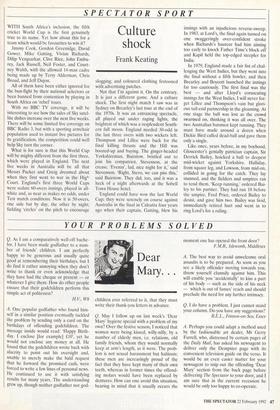SPECTATOR SPORT
Culture shock
Frank Keating
WITH South Africa's inclusion, the fifth cricket World Cup is the first genuinely true to its name. Yet how about this for a team which would be favourites to win it?
Jimmy Cook, Gordon Greenidge, David Gower, Mike Gatting, Vivian Richards, Dilip Vengsarkar, Clive Rice, John Embu- rey, Jack Russell, Neil Foster, and Court- ney Walsh, with the allowed 14-man cadre being made up by Terry Alderman, Chris Broad, and Jeff Dujon.
All of them have been either ignored for the bun-fight by their national selectors or been banned from contention by playing in South Africa on 'rebel' tours.
With no BBC TV coverage, it will be interesting to see how the sales of Sky satel- lite dishes increase over the next five weeks. There will be some limited live coverage on BBC Radio 3, but with a sporting armchair population used to instant live pictures for its gratification, the competition could well help Sky turn the corner.
What is for sure is that this World Cup will he mighty different from the first three, which were played in England. The next five weeks in Australia will be all that Messrs Packer and Greig dreamed about when they first went to war in the Hie Court. England's first three World Cups were sedate 60-overs innings, played in all- white and, as near as makes no odds, under Test match conditions. Now it is 50-overs, one side bat by day, the other by night; fielding 'circles' on the pitch to encourage slogging; and coloured clothing festooned with advertising patches.
Not that I'm against it. On the contrary. It is just a different game. And a culture shock. The first night match I saw was in Sydney on Brearley's last tour at the end of the 1970s. It was an entrancing spectacle, all played out under raging lights, the brightest of which was a resplendent South- ern full moon. England needed 30-odd in the last three overs with two wickets left. Thompson and Lillee were back for the final killing thrusts and the Hill was boozed-up and baying. The ginger-headed Yorkshireman, Bairstow, bristled out to join his compatriot, Stevenson, at the crease. `Evenin', lad, nice night for it,' said Stevenson. 'Right, Stevo, we can piss this,' said Bairstow. They did, too, and it was a heck of a night afterwards at the Sobel! Town House hotel.
England could have won the last World Cup; they were serenely on course against Australia in the final in Calcutta four years ago when their captain, Gatting, blew his innings with an injudicious reverse-sweep. In 1983, at Lord's, the final again turned on one swaggeringly over-confident stroke when Richards's hauteur had him aiming too early to knock Father Time's block off and Kapil held the top-edged steepler for India.
In 1979, England made a fair fist of chal- lenging the West Indies, but they went into the final without a fifth bowler, and then Brearley and Boycott launched the innings far too cautiously. The first final was the best — and after Lloyd's coruscating innings for the West Indies, I will never for- get Lillee and Thompson's vain but glori- ous tail-end partnership in the gloaming. At one stage the ball was lost as the crowd swarmed on, thinking it was all over. The two Australian batsmen kept running. They must have made around a dozen when Dickie Bird called dead-ball and gave them only a single.
Like once, years before, in my boyhood, Gloucester's genially patrician captain, Sir Derrick Bailey, hoicked a ball to deepest mid-wicket against Yorkshire. Halliday, from square leg, and Lowson, from mid-on, collided in going for the catch. They lay stunned, and the fielders and umpires ran to tend them. 'Keep running,' ordered Bai- ley to his partner. They had run 18 before the umpire, Fred Price, ordered Bailey to desist, and gave him two. Bailey was livid, immediately retired hurt and went in to ring Lord's for a ruling.


















































 Previous page
Previous page